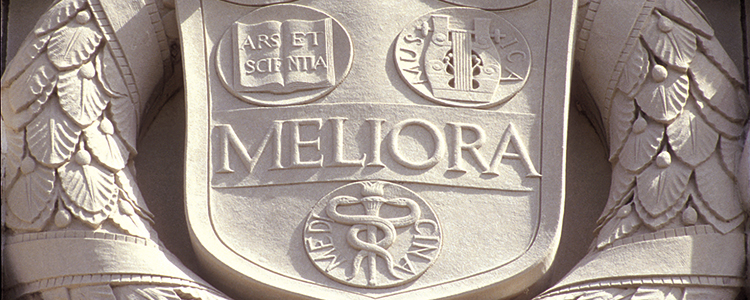Curriculum

The Curriculum is intended to develop the skills necessary for pursuing research in the chosen discipline. It includes the core courses that are required for all students, and electives chosen by the student and advisor to augment topics relevant to the individual's research. Core courses are usually completed in the first year of study.
Curriculum for all Students Entering the Program prior to the Fall of 2015
Core Course Curriculum for Ph.D. Students
(For students entering the program in the fall of 2015, or thereafter)
The Core Curriculum is designed to: (1) accelerate time-to-degree for doctoral students, (2) ensure that trainees can fully immerse themselves in independent research by the start of the second year, (3) accelerate the transition from a didactic undergraduate learning style to a self-directed, autonomous, adult learning style, and (4) to create the curricular “space” to allow trainees to explore a diversity of research career options. The required core curriculum for the program, all of which is completed in the first year of graduate training, is:
Core Requirements Common to All Three Tracks
- IND 501 - Ethics in Research
- IND 431 - Foundations in Modern Biology I
- IND 432 - Foundations in Modern Biology II
- MBI 501 - Microbiology & Immunology Student Seminar
- MBI 507 - Laboratory Rotations
- MBI 519 - Experimental Design and Analysis
Year 1
Fall Semester
Required:
- IND 431 - Foundations in Modern Biology (5 credits)
- IND 501 - Ethics in Research (1 credit)
- MBI 501 - Student Seminar (1 credit)
- MBI 519 - Experimental Design and Analysis (1 credit)
- MBI 506 - Scientific Writing in Research (1 credit)
- MBI 507 - Laboratory Rotations (add # of credits needed to total 16 including one option below)
In addition students must choose one of the following course options, based on their Track (Immunology, Microbiology or Virology)
Immunology Track option:
- MBI 473 - Immunology 3 credits and
- MBI 573 - Immunology Seminar 2 credits
Microbiology Track option:
- MBI 414 - Microbial Pathogenesis 3 credits and
- MBI 514 - Pathogenesis Seminar 1 credits
Virology Track option:
Total 16 credits
Spring Semester Year 1
Required:
- IND 432 - Foundations in Modern Biology II (5 credits)
- MBI 501 - Student Seminar (1 credit)
- MBI 507 - Laboratory Rotations (1 credit)
- MBI 506 - Scientific Writing in Research (1 credits)
In addition students must choose one of the following course options, based on their Track (Immunology, Microbiology or Virology)
Immunology Track option:
- MBI 515 - Advanced Immunology (4 credits)
Microbiology Track option:
- MBI 521 - Microbial Gen/Phys Seminar 1 credits
- MBI 421 - Microbial Genetics and Physiology 3 credits and
Virology Track option:
- MBI 456 Virology (4 credits)
Total 16 credits
Years 2-4
After the first year of didactic course work, students immerse themselves in their research, seminar based classes and electives chosen in consultation with their advisor and thesis committee.
Immunology Track:
- MBI 540 - Advanced Topics in Immunology (one semester)
- MBI 580 - Immunology Research-in-Progress Seminar (at least six semesters)
Microbiology Track:
- MBI 570 - Advanced Topics in Molecular Microbiology (at least six semesters)
Virology Track:
- MBI 588 - Virology Research Seminar Series (at least six semesters)
- MBI 589 - Advanced Topics in Virology (at least two semesters)
Special Topics Courses
Science Communication for Diverse Audiences (MBI 492)
Science Communication for Diverse Audiences (MBI 492) offers a hands-on based approach to improve science communication skills. Students will have the opportunity to work in small groups to learn basic presentation skills, distill their scientific message for a multitude of audiences, and become more comfortable presenting in front of groups. We will focus on improving communication with both scientific and non-scientific audiences. This course integrates some of the newest training techniques in the field including improv and story telling, which serve to help scientists better connect to audiences in the moment. The course will also offer brief sections on writing for non-scientific audiences. Participants should come ready to step outside of their comfort zone and dive into a variety of different training techniques from week to week.
Rotations
Rotations in the first year of study in three different laboratories allow the students to gain experience with methodology and instrumentation, and to become familiar with prospective research advisors for their thesis project. At the end of the first year, students choose a permanent advisor and embark on a Ph.D. thesis research program. Students may choose any faculty member in the School of Medicine and Dentistry or a participating faculty member in the College of Arts and Sciences as their research advisor.
Learn more about lab rotations.
Qualifying Examinations
A Qualifying Examination at the end of the second year of studies is a means of determining the potential of the student for independent thought, experimental acumen, comprehension of the general field, and potential for exploiting a relevant problem in a scientifically sound manner. The M.S. degree is awarded upon successful completion of this examination.
Teaching Assistantship
A one-semester Teaching Assistantship is required. Students usually complete this requirement in the second year of study.
Student Seminar Series
The Student Seminar Series (MBI 501) is designed to develop the organizational and speaking skills necessary for an independent career in research and to facilitate exchange of research information within the program.
Thesis
At the end of the first year, students choose a permanent advisor and embark on a Ph.D. thesis research program. Students may choose any faculty member in the School of Medicine and Dentistry or a participating faculty member in the College of Arts and Sciences as their research advisor. The Ph.D. is awarded based on development of an Independent Thesis Research Project as well as a written dissertation describing the rationale, methodology, results, conclusions and significance of the project.